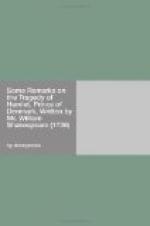Page 364.
Since the Poet deferred so long the Usurper’s Death, we must own, that he has very naturally effected it, and still added fresh Crimes to those the Murderer had already committed.
Upon Laertes’s Repentance for contriving the Death of Hamlet, one cannot but feel some Sentiments of Pity for him; but who can see or read the Death of the young Prince without melting into Tears and Compassion? Horatio’s earned Desire to die with the Prince, (p. 365, and Sequel,) thus not to survive his Friend, gives a stronger Idea of his Friendship for Hamlet in the few Lines on that Occasion, than many Actions or Expressions could possibly have done. And Hamlet’s begging him to draw his Breath in this Harsh World a little longer, to clear his Reputation and manifest his Innocence, is very suitable to his virtuous Character, and the honest Regard that all Men should have not to be misrepresented to Posterity; that they may not let a bad Example, when in reality they have set a good one; which is the only Motive that can, in Reason, recommend the Love of Fame and Glory.
Page 366.
When the Ambassadors from England say,
Where shall we have our Thanks?
And Horatio answers,
Not from his Mouth,
He never gave, &c.
I wonder that Mr. Theobalds should see any Difficulty in this; for it is but applying to the King what Horatio says, who knew the whole Affair, and then his Answer is just and true; and indeed, I think it cannot well be understood in any other Sense from the whole Tenour of the Passage.
Horatio’s Desire of having the Bodies carried to a Stage, &c. is very well imagined, and was the best way of satisfying the Request of his deceased Friend. And he acts in this, and in all Points, suitably to the manly, honest Character under which he is drawn throughout the whole Piece. Besides, it gives a sort of Content to the Audience, that tho’ their Favourite (which must be Hamlet) did not escape with Life, yet the greatest amends will be made him, which can be in this World, viz. Justice done to his Memory.
Fortinbrass comes in very naturally at the Close of this Play, and lays a very just Claim to the Throne of Denmark, as he had the dying Voice of the Prince. He in few Words gives a noble Character of Hamlet, and serves to carry off the deceased Hero from the Stage with the Honours due to his Birth and Merit.
I shall close these Remarks with some general Observations, and shall avoid (as I have hitherto done) repeating any Thing which has been said by others, at least as much as I possibly can: Nor do I think it necessary to make an ostentatious Shew of Learning, or to draw quaint Parallels between our Author and the great Tragic Writers of Antiquity; for in Truth, this is very little to the Purpose in reviewing Shakespeare’s




